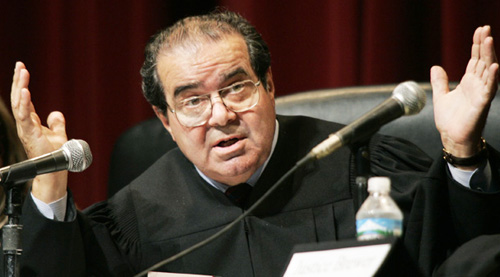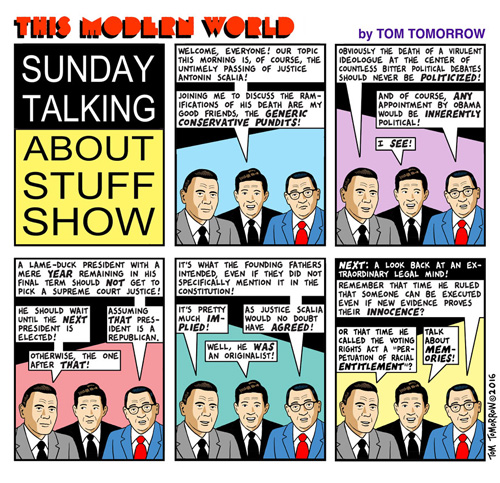Scalia death changes future for Chicago Teachers Union... Agency fees will likely continue now that the Supreme Court is split...
Although there has been a great deal written and discussed about the impact of the death of Supreme Court Justice Antonin Scalia on the future, there is a probable direct impact on the Chicago Teachers Union. For decades, the CTU, along with other unions that have exclusive bargaining rights, has had the right to collect "agency fees" from those who choose not to be union members. The legal theory since the late 1960s has been that citizens have the right to refuse to join a union, but if they do so they are required to pay what are called "agency fees" because the union has done the work to negotiate a contract which applies to everyone working in the district.
 Supreme Court Justice Antonin Scalia's death throws into question the future of the "Friedrichs" case, which has been trying to end agency fees for unions. Mother Jones photo.Years ago, Scalia actually supported the concept of the "agency fee." In a decision during the 1990s, as reported in the Los Angeles Times, "Scalia, as it happens, had been a question mark on Abood, in part because of a concurring opinion he had written in 1991 that upheld agency fees. 'Where the state imposes upon the union a duty to deliver services,' he wrote then, 'it may permit the union to demand reimbursement for them; or, looked at from the other end, where the state creates in the nonmembers a legal entitlement from the union, it may compel them to pay the cost.'"
Supreme Court Justice Antonin Scalia's death throws into question the future of the "Friedrichs" case, which has been trying to end agency fees for unions. Mother Jones photo.Years ago, Scalia actually supported the concept of the "agency fee." In a decision during the 1990s, as reported in the Los Angeles Times, "Scalia, as it happens, had been a question mark on Abood, in part because of a concurring opinion he had written in 1991 that upheld agency fees. 'Where the state imposes upon the union a duty to deliver services,' he wrote then, 'it may permit the union to demand reimbursement for them; or, looked at from the other end, where the state creates in the nonmembers a legal entitlement from the union, it may compel them to pay the cost.'"
At the time of Scalia's death, the Supreme Court was expected to rule in the case of Friedrichs v. California Teachers Association, the latest agency fee case. The teacher plaintiffs in Friedrichs claim that the agency fee requirement in whatever amount is forcing them to pay for the "speech" of the union in politics, thereby depriving them of their First Amendment right to disagree with the union positions. At the time of Scalia's death, it was not clear how the entire nine-member court would rule in Friedrichs, but many observers expected Scalia to reneg on his previous position and take the conservative side.
A February 16, 2016 Los Angeles Times article provides readers with context and an explanation of the potential impact of Scalia's death. Readers should note, also, that even if the Court ties on Friedrichs this term, the plaintiffs are expected to try and return the case to the Court later -- for "re-review."
Untold Story: How Scalia's Death Blew Up an Anti-union Group's Grand Legal Strategy, Michael Hiltzik, February 16, 2016, Los Angeles Times
The implications of Supreme Court Justice Antonin Scalia's death for the anti-union case known as Friedrichs are a bit uncertain. Some experts say the appellate ruling in favor of the union would be effectively affirmed by an evenly divided court. Others believe the court will ask for re-argument of the same case next term, presumably after it gets back up to full nine-member strength by the appointment and confirmation of successor to Scalia.
The late Supreme Court Justice Antonin Scalia was expected to vote against public employee unions in an anti-union case. , Mark Avery/ZUMA,
The anti-union lawsuit known as Friedrichs vs. California Teachers Assn. is widely viewed as one of the leading casualties of Supreme Court Justice Antonin Scalia's death.
 Once again, "Tom Tomorrow" shows the contradictions of the crazy conservatives.What's less well-known is how the anti-union plaintiffs connived to fast-track the case through the federal judiciary in order to get it before the court while it still harbored a conservative majority. Their method was to encourage the lower courts to rule against them, so they could file a quick appeal. But Scalia's passing is likely to leave a 4-4 deadlock over the case, so the last ruling, in which the U.S. 9th Circuit Court of Appeals ruled for the teachers union, remains in force.
Once again, "Tom Tomorrow" shows the contradictions of the crazy conservatives.What's less well-known is how the anti-union plaintiffs connived to fast-track the case through the federal judiciary in order to get it before the court while it still harbored a conservative majority. Their method was to encourage the lower courts to rule against them, so they could file a quick appeal. But Scalia's passing is likely to leave a 4-4 deadlock over the case, so the last ruling, in which the U.S. 9th Circuit Court of Appeals ruled for the teachers union, remains in force.
This wasn't how the anti-union group behind the lawsuit, the Center for Individual Rights, expected things to work out. As we write, the group's website still features a photograph of nominal plaintiff Rebecca Friedrichs and the center's lawyers standing in front of the Supreme Court on Jan. 10, looking plenty chuffed about that morning's oral arguments, which plainly went their way. The poet Robert Burns had a line for the subsequent developments: "The best-laid schemes o' mice an' men gang aft agley."*
Here's the background, drawn in part from our previous coverage here and here.
The target of the Friedrichs lawsuit, and several others just like it, is the "agency" or "fair share" fee. Under the law and according to a 1977 Supreme Court decision known as the Abood case, unionized public employees can be assessed nonmember fees to cover solely the cost of negotiations and contract enforcement, without being compelled to join the union and support its political activities by paying full union dues. That's the arrangement in California.
For decades, union opponents have been trying to get Abood overruled. Friedrichs, like the other cases, paints the challenges as blows on behalf of free speech; the argument is that the public employees compelled to pay agency fees are being forced to support political positions taken by their unions with which they disagree, and therefore their freedom of speech is being infringed. In truth, however, these lawsuits aren't about free speech or improving education for children. They're about silencing the political voice of teacher unions by cutting off their revenues.
Abood as a precedent has withstood previous attacks, but the conservative Supreme Court majority had begun to signal that it was primed to overturn Abood, notably in cases in 2012 and 2014. Friedrichs was the stiffest test yet.
Plainly aware that Abood was hanging by a thread, the Center for Individual Rights strived to speed the Friedrichs case through the lower court after it was filed in 2013. It did so by conceding in both federal court in Santa Ana and at the 9th Circuit that both would be bound by the Abood precedent; therefore, it asked both courts to simply rule in the teacher union's favor so it could promptly carry the appeal to the Supreme Court. Both lower courts did so.
This doesn't mean that the the lower courts were seriously expected to rule against the union on their own. The 9th Circuit Appeals Court, for one thing, is a generally liberal court that was likely to reject the anti-union challenge in any event. But the strategy greased the way for the ultimate appeal by avoiding the time-consuming briefings and arguments usually employed to build a factual record to bring to Washington. The center formally petitioned the court to accept the case in January 2015, and the Court agreed in June.
At oral arguments last month, the strategy appeared to have borne fruit. Observers almost unanimously concluded from the questions posed by the justices that Abood was on the verge of being scrapped, by a 5-4 vote.
Scalia, as it happens, had been a question mark on Abood, in part because of a concurring opinion he had written in 1991 that upheld agency fees. "Where the state imposes upon the union a duty to deliver services," he wrote then, "it may permit the union to demand reimbursement for them; or, looked at from the other end, where the state creates in the nonmembers a legal entitlement from the union, it may compel them to pay the cost."
On the other hand, Scalia had concurred in the most direct attack on Abood yet, a 2014 opinion by Justice Samuel A. Alito Jr. that called the precedent "questionable," "troubling" and "unsupported." (Alito's ruling ultimately relied on grounds other than the Abood rule, so the precedent stood � for the moment.)
At the oral arguments in Friedrich, Scalia seemed to lean against Abood and the union, implying at one point that it might be hard to distinguish permissible nonpolitical fee charges from impermissible political charges because "everything that is collectively bargained with the government is within the political sphere, almost by definition." By general reckoning, he was ready to kill Abood.
Now that reckoning, of course, is moot.
The implications of Scalia's death for Friedrichs are a bit uncertain. Some experts say the appellate ruling in favor of the union would be effectively affirmed by an evenly divided court. Others believe the court will ask for re-argument of the same case next term, presumably after it gets back up to full nine-member strength by the appointment and confirmation of successor to Scalia. If the Senate sticks to what it says is its determination to not even consider approving a new justice until after a new president is sworn in next January, the delay could keep the Abood challenge at bay at least until late 2017. For now, at least, the unions have won.
But only for now.

